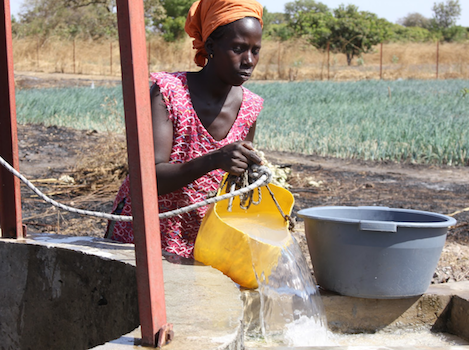Snapshot from Stockholm: Delivering Stability and Benefits through Water Security
This is the second in a series of blogs in which participants provide a recap of their Stockholm World Water Week event.
Water security is a core pillar of overall development. It is necessary for health, food security, livelihoods, energy, economic opportunities, and socio-economic growth. Water issues and conflicts can undermine political and social cohesion, supply and value chains, public and environmental health, and infrastructure operation and service delivery. USAID’s Sustainable Water Partnership (SWP) convened a session at Stockholm World Water Week 2017 along with the International Union for Conservation of Nature, mWater, the Stockholm Environment Institute, Tetra Tech, UNGC CEO Water Mandate, Winrock International, and World Resources Institute (WRI) called “Delivering Stability and Benefits through Water Security.”
The first part of the session introduced participants to tools that have been developed to help raise awareness among decision makers of water security risks in their region and how to engage these local and regional leaders in water management planning. Eric Viala, director of the Sustainable Water Partnership, introduced the SWP process for improving water security, and Betsy Otto, director of WRI's Global Water Program, provided an overview of Aqueduct, a global water risk-mapping tool that provides investors, governments, and others a visual understanding of worldwide water security under three themes of water resources, water management, and water risks.
Representatives from the private sector (Gap Inc., PepsiCo, CEO Water Mandate) and civil society joined scientific and development organizations in a panel discussion of the links between water security and wider development perspectives. Highlights of that discussion include:
-
Director of Stockholm International Research Institute Dan Smith linked water security to political security. He specifically explained how security in one country can be affected by water insecurity, citing worldwide tensions on grain prices in 2008 and 2010 as contributing factors to the Arab Spring events in Egypt, Syria, and Yemen.
-
Women and Water Program Manager at Gap Inc. Lisa Hook and Global Water Stewardship Manager of PepsiCo Inc. Tara Varghese explained that large multinational firms like theirs are concerned about water risks as these impact their supply and production chains, their reputations, and the health and livelihoods of their customers, most notably women. They consequently engage in understanding and reducing these risks through water productivity improvement actions in their processes, as well as support to local community WASH activities.
-
Amit Bando, senior director of the Clean Energy and Water Group at Winrock, made the link between water security and energy security, whereby water is needed for energy production while energy is used to pump drinking water and for irrigation. Improving water and energy services simultaneously is essential for socio-economic development, with renewable energies such as solar and wind being the solutions for remote "off-the-grid" communities.
-
Eric Viala demonstrated that water security is essential for the sustainability of WASH activities. Providing drinking water is only first step in human development: poverty alleviation and economic growth lead to larger water demands for other uses (hygiene, agriculture, and other livelihood and productive activities) that have to be considered along with WASH needs.
The Sustainable Water Partnership supports USAID thought leadership, innovation, and action in global water security.
By Eric Viala, Director of USAID’s Sustainable Water Partnership


